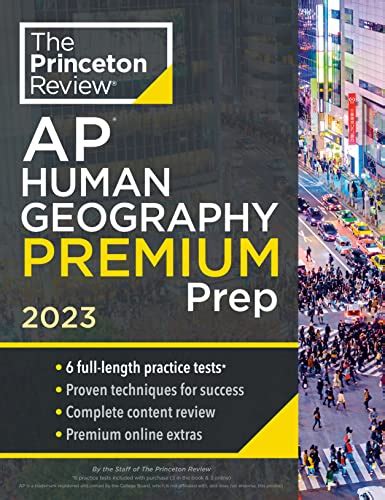Comprehensive Overview
The College Board’s Advanced Placement (AP) Human Geography exam evaluates students’ understanding of the world’s geographic patterns, processes, and relationships. With a focus on spatial perspective, environmental influences, and human-environment interactions, this exam challenges students to analyze global issues and apply geographic principles.

Essential Concepts
Spatial Perspectives
- Global Grid and Geographic Systems
- Geographic Distributions and Patterns
- Spatial Relationships and Connections
Environmental Processes
- Climate and Weather Systems
- Landforms and Landscapes
- Water Resources and Management
Human-Environment Interactions
- Population Distribution and Growth
- Economic Development and Land Use
- Cultural Diversity and Settlement Patterns
Exam Structure and Scoring
The AP Human Geography exam consists of:
- Multiple Choice (75%): 60 questions in 60 minutes
- Free Response (25%): 3 essay questions in 75 minutes
Students earn a score ranging from 1 (no response) to 5 (extremely well qualified).
Study Strategies
Engage with Course Materials
- Study textbooks, notes, and online resources
- Participate actively in class discussions and group projects
- Attend review sessions and study groups
Practice Regularly
- Utilize practice tests and sample essays
- Complete the AP Human Geography Practice Exam
- Time yourself during practice to improve pace and accuracy
Focus on Key Concepts
- Review the syllabus to identify essential topics
- Prioritize understanding spatial perspectives, environmental processes, and human-environment interactions
- Create concept maps and diagrams to visualize relationships
Apply Geographic Skills
- Develop spatial thinking skills by examining maps, graphs, and data
- Use geographic tools and technologies (e.g., GIS software)
- Analyze case studies and real-world examples
Common Mistakes to Avoid
- Ignoring Spatial Perspectives: Fail to consider geographic distances, patterns, and connections
- Oversimplifying Environmental Processes: Treat environmental systems as static or independent
- Neglecting Human-Environment Interactions: Overlook the complex relationships between humans and their environments
- Lack of Practice: Fail to engage in sufficient practice and preparation
- Poor Time Management: Run out of time during the exam due to slow reading or essay writing
Pros and Cons of AP Human Geography
Pros
- College Credit: Earn college credit for geography coursework
- Enhanced Geography Skills: Develop critical thinking, spatial reasoning, and data analysis abilities
- Global Perspective: Gain a comprehensive understanding of the world’s regions and cultures
- AP Diploma Qualification: Contribute to the AP Diploma Program for college admission
Cons
- Course Difficulty: The course requires significant time and effort to master
- Exam Pressure: The exam can be challenging and stressful
- Limited Job Prospects: May not lead directly to specific career paths in human geography
Frequently Asked Questions
1. What is the passing score for AP Human Geography?
A score of 3 (qualified) is considered passing.
2. How much time should I allocate for studying?
Aim for at least 150 hours of preparation, including class time, homework, and practice.
3. Can I take AP Human Geography without a prerequisite?
Yes, most schools do not require a prerequisite for the course.
4. What are some career opportunities related to AP Human Geography?
Graduates with a background in human geography can pursue careers in urban planning, environmental management, international development, and education.
5. Is AP Human Geography a good choice for me?
Consider taking AP Human Geography if you are interested in global issues, enjoy analyzing maps and data, and have strong writing skills.
6. What is a novel way to study for AP Human Geography?
Create geographic “scavenger hunts” by identifying landmarks or regions on maps and researching their significance.
